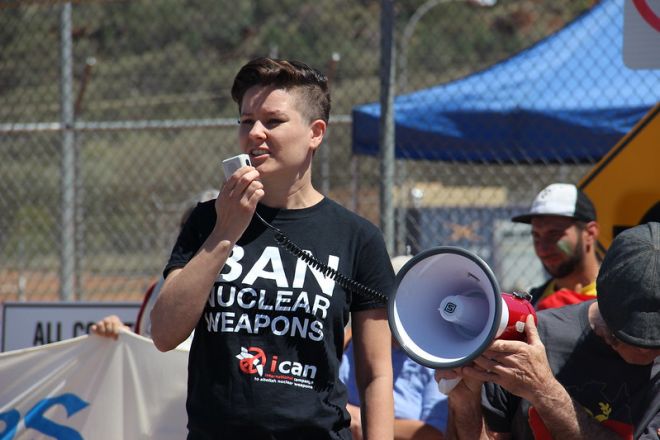New Series of Ray Acheson Articles on “Abolishing Structures of Violence”
Published on July, 23 2020
ICAN campaigner Ray Acheson of WILPF speaks at a September 2016 protest against the main US military base in Australia, Pine Gap, which is involved in nuclear targeting. Credit: Tim Wright.
By Odile Hugonot Haber
July 2020
Ray Acheson recently made available to us the beginning of a series of articles that she wrote under the title: “Abolishing Structures of Violence.” The articles are available in the Thoughts for Change Section of WILPF International’s website.
This series is meant to generate discussion and help us to engage in deeper reflection on our peace and justice work. I will introduce them briefly, hoping to entice you to read them since they really do enrich our analysis of current realities.
The first article, “What We Mean When We Talk About Abolition,” lists some abolitions we are asking for: the abolition of nuclear weapons and war, the abolition of police and prisons, the abolition of borders. It looks at these demands in a way that makes them plausible and rational, especially focusing on how they can help us build a new system based on “cooperation, equity, and justice for all.” This is the path that will help us to focus on the restoration of our communities, and provide stepping stones to rebuilding a world without war, a just world.
The facts in the second article, “Deconstructing Borders,” are deeply troubling. For example, “Right now in the world, about 70 million people are unroofed and on the run,” or “on any given day there are 50,000 asylum seekers and migrants in detention in the US.” It is not just numbers that are listed; Ray describes their condition, the causes, and the ever-increasing military, technological, detention, and surveillance industries that only grow more frightening.
There is much to learn in sections that describe the effects of capitalism, colonization, conflict, and climate change. With their far-reaching analysis, these discussions make us think about the meaning of borders, how they do not limit the employer class pitting wages of the people of one country against another, but continue to keep societies under feudal laws. Meanwhile, the workers are contained within these borders and sent to war under the name of nationalism, patriotism, etc.
Nuclear weapons make borders obsolete, since nuclear winter would affect all of us, as does global climate change.
Maybe it is time to reclaim an international movement, time to demand the abolition of nuclear weapons, and also of all weapons and of all wars. As Acheson writes, “we need to wrap our heads around this political project of care, of peace, and of justice in a comprehensive way.”
I hope I have interested you enough that you will decide to deepen your reading, to create your own discussions and perhaps contribute your own articles in the future. That’s what Ray hoped for in writing this series.



